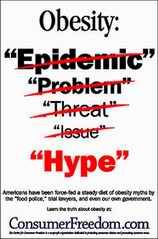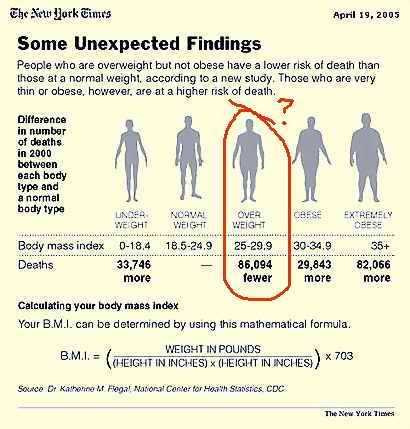 Days ago, my good friend Sassy Lawyer lamented in a post aptly titled Confuse Us Some More the "plethora of conflicting claims (about what to eat and what not to eat) that tends to confuse rather than help the common man."
Days ago, my good friend Sassy Lawyer lamented in a post aptly titled Confuse Us Some More the "plethora of conflicting claims (about what to eat and what not to eat) that tends to confuse rather than help the common man."I got no argument with that. It is really confusing. I'm sure almost everyone today echoes Tito Rolly's comments when he read my post about hotdogs, "It sure looks like we're running out of healthy food items to eat."
It sure looks that way. If you look at the advert on the left, you will even see some of the print ads they get in newspaper dailies in the US. Yesterday morning, I was able to catch Matt Lauer and Katie Couric of NBC's Today Show showing a video footage of the "Soup Nazi" weighing people and deciding who eats and who doesn't.
The ads might really seem outrageous and downright sarcastic, but the real feeling is confusion. Matters got worse last week when respected researchers from the CDC and the NIH reported in the April 20 issue of JAMA that "though 112,000 more obese people die each year compared with "normal weight" people, 86,000 fewer "overweight" people do."
The JAMA article challenged last year's CDC claim that almost 400,000 die each year due to obesity. The researchers say it's just 112,000. Nearly a 73 percent reduction! The New York Times even reacted with "Some Extra Heft Maybe Helpful..." and a witty editorial days later saying, "You Can Be Too Thin, After All." The awesome point raised by the study was that people classified as OVERWEIGHT but not obese (by BMI) had a LOWER DEATH RISK than people of normal weight.

Expectedly, critics of the obesity epidemic scare saw more than a dent in the armor of the CDC people, and like a hungry tiger cornering its prey, it launched a USD$600,000-media blitz counting the obesity advert image (and numerous tri-media ads) you see at the top.
Currently in the frontline of critics is Richard Berman, who is behind the Center for Consumer Freedom, a group founded "10 years ago with tobacco-company and restaurant money to fight smoking curbs in restaurants" but in 2001 "shifted its focus to food and beverage issues." For more of Mr. Berman's agenda, read this very insightful link from the Washington Post.
 Another source of confusion and opportunity seen by critics is the food pyramid revision done by the USDA. If you go to their website, you will see that the new food pyramid is now customized, friendlier and more useful than the older one...provided you have a computer connection at home, because the usefulness of the new pyramid depends a lot on your inputs.
Another source of confusion and opportunity seen by critics is the food pyramid revision done by the USDA. If you go to their website, you will see that the new food pyramid is now customized, friendlier and more useful than the older one...provided you have a computer connection at home, because the usefulness of the new pyramid depends a lot on your inputs.Weeks ago, in yet another example of conflicting health views, my blogger friend Bob of Raw Data emailed me this link from the American Journal of Clinical Nutrition to offer a different view regarding posts I made about Vitamin E supplementation last year (see here and here). My position regarding vitamins and minerals remain the same: the best sources of vitamins are not the pills we buy from pharmacies, but in the food items that we eat. You should know your daily requirement and get it daily from your diet.
All these conflicting news and study items give people more confusion than clarity on how they'd be able to remain healthy. My sound advice is to do the research yourself if you are really in doubt. It sure promises to be long, boring, and tedious, but at least you'd be able to trust whatever conclusion you'd get. Another alternative is to ask your personal physician what he thinks is best for you (let's pray he stays abreast with all these news items coming out).
 I think the problem with obesity is with classification. Leading health agencies like the CDC and WHO rely heavily on the Body Mass Index (BMI) in classifying who is obese and who is overweight. But do you know that if we strictly adhere to the BMI classification, then, Governor Arnie (as you can see on the left), along with Kobe Bryant, Tom Cruise, Will Smith, Pierce Brosnan, and even President Bush are all classified as "overweight" people?
I think the problem with obesity is with classification. Leading health agencies like the CDC and WHO rely heavily on the Body Mass Index (BMI) in classifying who is obese and who is overweight. But do you know that if we strictly adhere to the BMI classification, then, Governor Arnie (as you can see on the left), along with Kobe Bryant, Tom Cruise, Will Smith, Pierce Brosnan, and even President Bush are all classified as "overweight" people? If you took the BMI classification seriously, then you will also find that amazingly, "nearly half the players in the NBA qualify as overweight."
The BMI's limitation is that it does not take into account frame size, body fat percentage, or muscle mass. It works in the majority of cases, but the exceptions are also considerable (read this good link on BMI and be enlightened). Hence, it is not surprising that April 20 JAMA study found a huge discrepancy. Wrong premises will naturally result to wrong conclusions, and critics can always smell blood and will attack at every opportunity.
If the food pyramid can get a make-over, my opinion is that the BMI should also get a revision. We should get a classfication tool that measures fat as the main reason for obesity and being overweight. Bone and muscle mass shouldn't be part of the computation at all.
What many people don't realize is that the obesity issue is not merely a health subject, but also a battleground for politicians and businessmen who will do everything to advance their self-interests. The sad victim is always the common man who can't always say who's telling the truth.
1 reactions:
I like your stance, and I find it for the most part true, but as far as the BMI, there are some issues, there is not a simple way to omit muscle, organs, and bone, because just as fat varies from person to person this does as well, you would need some specialized measuring device.
you can get these things checked roughly at the doctor.
I would rather suggest that the BMI be used as a rough personal guide and possibly a starting point in self understanding in the matter, if you calculate your BMI, and you feel that your muscle and bone don't make up a significant amount of the value then your are more likely over weight and might want to see a doctor for a second opinion and more information.
Start with some of the scary things to get them out of the way like diabetes, perhaps your body processes the food in a different way causing greater stores.
I always tell everyone that there are three things to any good diet or health plan. Most diets you see only pick 1.
those three things are quality, quantity, and frequency. It has nothing to do with health and everything to do with unbiased mechanics. this is backed by the basic concept of moderation, even water in it's purest form is poison, so maybe nature giving us things in a more diluted form is good.
Sorry Ranting a bit but I feel your on to something here, just don't take it to far or the same mistake will happen again.
Post a Comment